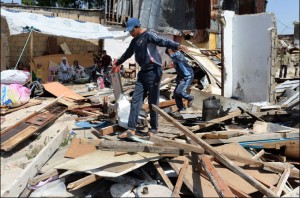By Siham Ali
for Magharebia in Rabat

Youths walk among the remains of houses after bulldozers cleared the oldest slum in Casablanca in June 2014 (AFP/Fadel Senna)
The monitoring centre for Morocco’s National Human Development Initiative says more should be done to target beneficiaries.
Nearly ten years after Morocco launched a project to fight poverty and social exclusion, the report card is in.
The official report on the first phase of Morocco’s National Human Development Initiative (INDH) will be presented in Rabat on Wednesday (December 17th), but a December 8th meeting hinted at the results.
They are mixed.
More than 8 million people have benefitted from the scheme. It has also helped to start up 34,000 projects, including 6,000 income-generating activities.
During a December 8th meeting to evaluate the initiative, INDH official Soulaiman El Hajam stated that 97% of the activities were operational.
But National Human Development Monitoring Centre Secretary-General El Hassan El Mansouri noted that the initiative would benefit from improved targeting of beneficiaries.
The method in which INDH funds are being distributed to the target groups needs an overhaul, the centre found.
According to El Mansouri, the geographical targeting of the INDH is being refined to better fit the needs of the target groups, such as the current discussions about the Caisse de Compensation (Subsidisation Fund).
In rural areas, the INDH does not appear to have had much impact on access to infrastructures and basic services, even though these were among the initiative’s main goals.
The INDH also has had little effect on child health or school enrolment.
Basma Mourtadi, a sociologist, says INDH officials should put more emphasis on education and health.
Although the creation of income-generating activities is an important part of poverty reduction, she says, indicators of health and access to healthcare services need to improve if social exclusion is to be eradicated.
Economist Mohamed Toumami says the INDH must be improved in terms of local governance, including at the commune level. He says that communes must follow through with the projects that are started up so that their viability can be guaranteed.
“So far, we have seen that local authorities in the target areas are doing little to keep projects going. It’s time to take action to rectify this failing,” he argues.
Citizens have hailed the INDH for helping to improve living standards for the population. However, there have been calls for transparency in the way beneficiaries are chosen.
Jamila Radi, a teacher, says that the eligibility criteria must be clear and that the door must be open to all impoverished citizens so that they can submit requests to receive help.
To improve the initiative’s performance, consultation meetings are being held regularly with stakeholders and donors in order to address the failings.







